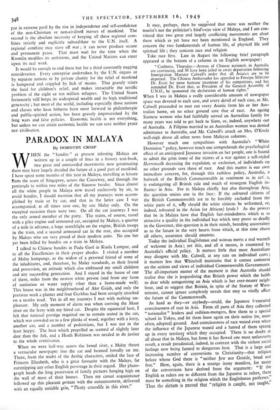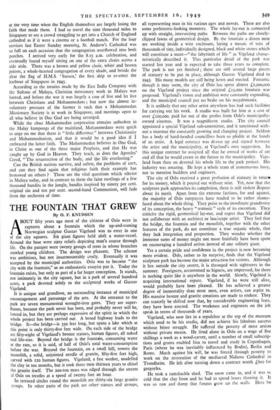PARADOX IN MALAYA
By DOROTHY CRISP
WI IEN the " bandits " at present infesting Malaya are written up in a couple of lines in a history text-book, two great and unrecorded movements now germinating there may have largely decided the future of a good part of mankind. I have spent some months of this year in Malaya, travelling at leisure from the town of Singapore, across the Causeway, and through the peninsula to within two miles of the Siamese border. Since almost all the white people in Malaya now travel exclusively by air, to avoid bandits, I should mention that all my journeys were accom- plished by train or by car, and that in the latter case I was accompanied, at all times save one, by one Malay only. On the excepted occasion there were two. On all the car journeys I was the only armed member of the party. The trains, of course, travel with a pilot engine and armoured car, occupied by Malays, a quarter of a mile in advance, a huge searchlight on the engine, British troops in the train, and a second armoured car in the rear, also occupied by Malays who are very proud of their modern arms. No one has yet been killed by bandits on a train in Malaya.
I talked to Chinese bandits in Pudu Gaol in Kuala Lumpur, and to all the Excellencies in their proper abodes. I visited a number of Malay kampongs, as the widow of a personal friend of some of the inhabitants, and, therefore, by Malay standards, as their friend and possession, an attitude which also embraced my small children and any succeeding generation. And I stayed in the house of one of them, miles from the nearest white person (and from any form of sanitation or water supply other than a home-made well). This house was in the neighbourhood of Alor Gajah, and only the previous week a planter and four Gurkhas had been savagely attacked on a nearby road. Yet in all my journeys I met with nothing un- pleasant. My only moment of alarm was when crossing the Maur river on the ferry with my hired car. Despite the equatorial heat, I felt that national prestige required me to remain seated in the car, which was crowded on to a few planks of wood, together with a lorry, another car, and a number of pedestrians, but I was not in the least happy. The boat which propelled us seemed of slightly later date than the Ark, and a Heath Robinson was needed to do justice to the whole contrivance.
When we were half-way across the broad river, a Malay thrust a vernacular newspaper into the car and beamed broadly on me. There, from the midst of the Arabic characters, smiled the face of Princess Elizabeth, who is a great favourite with the Malays, far outstripping any other English personage in their regard. Her photo- graph heads the long procession of family pictures hanging high on the wall of most of their houses. Then my casual acquaintance followed up this pleasant gesture with the announcement, delivered with an equally amiable grin, " Plenty crocodile in this river." It may, perhaps, then be suggested that mine was neither the tourist's nor the politician's bird's-eye view of Malaya, and I am con- vinced that two great and largely conflicting movements are afoot there which as yet have not been mentioned in England. They concern the two fundamentals of human life, of physical life and spiritual life ; they concern race and religion.
Take race first. Late in August the following brief paragraph appeared at the bottom of a column in an English newspaper :
" Canberra, Thursday.—Arrests of Chinese nationals in Australia are continuing, and 30 have been jailed to await deportation following Immigration Minister Calwell's order that all Asiatics are to be deported. The Chinese Ambassador has appealed to Foreign Minister Dr. Evatt for more humane treatment of his compatriots, and has reminded Dr. Evatt that, as President of the General Assembly of U.N.O., he sponsored the declaration of human rights."
When I was in Malaya a really considerable amount of newspaper space was devoted to each case, and every detail of each case, as Mr. Calwell proceeded to root out every Asiatic from his or her Aus- tralian home, on no other ground save that of race. An ageing Siamese woman who had faithfully served an Australian family for many years was told to get back to Siam, or, indeed, anywhere out of Australia. A Filipino married to an Australian woman was denied admittance to Australia, and Mr. Calwell's attack on Mrs. O'Keefe well-nigh drove all other news from Malayan columns.
However much one sympathises with Australia's " White Dominion " policy, however much one comprehends the psychological effect of an anticipated Japanese invasion on her people, one is bound to admit the grim irony of the victors of a war against a self-styled Herrenvolk decreeing the expulsion, or exclusion, of individuals on no other grounds save those of race. And this matter is our own immediate concern, for, through this ruthless policy, Australia, a bulwark of the British Commonwealth in sentiment as in act:..a, is endangering all British rule and much of resurgent English in- fluence in Asia. For in Malaya chiefly. but also throughout Asia, the question smites one in the face: If the coloured citizens of the British Commonwealth are to be forcibly excluded from the white parts of it, wAy should the white citizens be welcomed, or, indeed, tolerated in the Asian (or African) lands ? As the powers that be in Malaya have that English fair-mindedness which is so attractive a quality in the individual but which may prove so deadly in the Governor, this question is in their minds, breeding uncertainty as to the future in the very hearts from which, at this time above all others, assurance should emanate.
Today the individual Englishman and woman meets a real warmth of welcome in. Asia'; yet this, and all it means, is countered by Australia's official policy. It matters little that most Australians may disagree with Mr. Calwell, at any rate on individual cases ; it matters less that Whitehall maintains that it cannot comment on the actions and views of individual Commonwealth Governments. The all-important matter of the moment is that Australia should realise that she is jeopardising that British power which she holds so dear while antagonising an Asia which is her ever-nearer neigh- bour, and to suggest that Britain, in spite of the Statute of West- minster, cannot ignore completely trends that may so vitally affect the future of the Conunonwealh.
As hard as they—or anybody—could, the Japanese fermented consciousness of race in Asia. From all parts of Asia they collected " nationalist " leaders and sedition-mongers, flew them to a special school in Tokyo, and let them loose again on their native (or, more often, adopted) ground. And consciousness of race waxed even when the influence of the Japanese waned and a hatred of them sprang up in every territory which they occupied. There is no doubt at all about that in Milaya, but from it has flowed one most unforeseen result, a result paradoxical, indeed, in contrast with the violent racial feelings now being fanned to dangerous heat. That is a large and increasing number of conversions to Christianity—that religion before whose God there is " neither Jew nor Gentile, bond nor free." Here, again, there is a strange irony manifest, for many of the conversions have derived from the argument: " If the English as rulers are so different from the Japanese as rulers, there must be something in the religion which the Englishman professes." Thus the dictum is proved that " religion is caught, not taught,"
at the very time when the English themselves are largely losing the faith that made them. I had to travel the nine thousand miles to Singapore to see a crowd struggling to get into a Church of England cathedral as if it were a cinema or a football match. For the four services last Easter Sunday morning, St. Andrew's Cathedral was so full on each occasion that the congregation overflowed into both porches. I arrived very early for the 8.15 a.m. celebration, and eventually found myself sitting on one of the extra chairs across a side aisle. There was a brown and yellow choir, white and brown priests, a whole-hearted congregation of every shade, and beside the altar the flag of H.M.S. ' Sussex,' the first ship to re-enter the harbour of Singapore in z945.
According to the treaties made by the East India Company with the Sultans of Malaya, Christian missionary work in Malaya was barred, and before the war it was largely a case of live and let live between Christians and Mohammedans ; but now the almost in- voluntary pressure of the former is such that a Mohammedan Missionary Society is at work in Singapore, and meetings open to all who believe in One God are being arranged.
While the close Mohammedan corporation remains unbroken in the Malay kampongs of the mainland, Mohammedans were quick to urge on me that there is " little difference " between Christianity and Mohammedanism, and that it would be a good idea if I embraced the latter faith. The Mohammedan believes in One God, in Christ as one of the three major Prophets, and that He was caught up by God in Heaven. They teach, as does the Apostles' Creed, " The resurrection of the body, and ate life everlasting."
Can the British nations survive, and soften, the problems of race, and can they find again that religious faith their example has bestowed on others ? These are the vital questions which vibrate in Malaya today, and in contrast to them the faint rustlings of a few thousand bandits in the jungle, bandits inspired by ninety per cent. original sin and ten per cent. second-hand Communism, will fade from the orchestra of time.



































 Previous page
Previous page